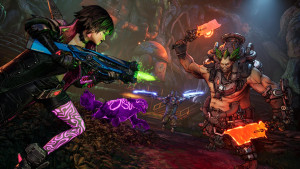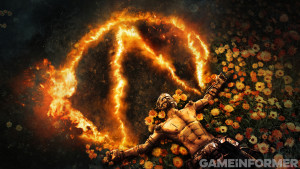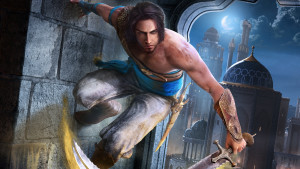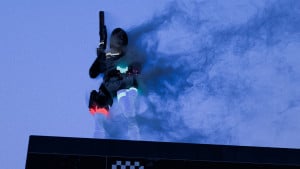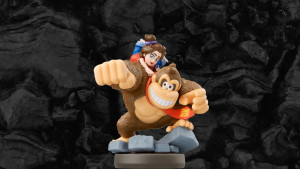Last chance for early bird pricing! Subscribe by June 25th to receive the debut issue
Editorial: Reign Of The Antiheroes
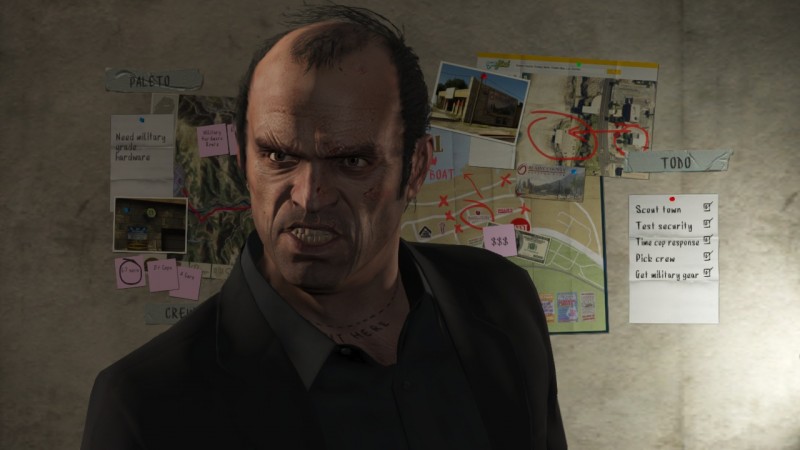
A few days ago, I wrote a blog highlighting the television shows I enjoy watching. As I dissected my fascination with Sons of Anarchy, Breaking Bad, House of Cards, It’s Always Sunny in Philadelphia,
and a handful of other dramas, I realized most of my television viewing
is about horrible people who do horrible things; the antiheroes of
primetime.
I was a little alarmed by my discovery, and
decided to hold off on publishing the blog until I explored the
television landscape more. That examination evolved into an
all-encompassing look at all of the entertainment I digest and crave. As
I discovered, much of it centers on the antihero.
I’m not alone
in my appreciation of entertainment starring corrupt politicians, bank
robbers, spray paint-huffing sickos, and gods who want to de-limb other
gods.
Grand Theft Auto V, a game that focuses on three different
murderous antiheroes, raked in $1 billion in sales in just three days. Breaking Bad
won this year’s Emmy for “Outstanding Drama” for its bleak tale of an
ordinary man who turns into a meth-cooking monster. Even the children’s
film Despicable Me 2, which pulled in over $850 million in the
worldwide box office, places a prototypical villain in the spotlight,
creating humor based off of his nefarious actions.
The breed of
antihero I’m the most captivated by is a surprisingly common mold: dark
in concept, but relatable on an every day level.
The scribes
behind Dexter Morgan know his show wouldn’t be engaging if he were just a
cold-blooded serial killer. They go well out of their way to humanize
him. He has a wife, children, a loving sister, coworkers that seem like
great people. Outside of the “Dark Passenger” in his mind, he’s painted
as an ordinary antisocial. For me, the most tension this show delivers
is the fear of the people close to him finding out who he really is.
Another
carrot that writers dangle in front of their respective audiences is
the belief that many of these characters may see the error of their ways
and redeem themselves in some capacity. Part of me watches Breaking Bad
wanting Walter White to become the kingpin of crime. The other part of
me wants him to get out of the business and return to a normal life with
his family. From the moment that show turned ugly, I hoped for a happy
ending for Walt and all involved. That dynamic kept me on the edge of my
seat.

Grand
Theft Auto V’s protagonist Michael De Santa explains the emotional
conflict antiheroes face in a conversation with his therapist. “I want
to be a good dad, love my family, and live the dream. But at the same
time, I really want the other stuff too." It’s a nice thought, but in
Michael’s story, the criminal element dominates the human one. He’s
abusive to his family, and their thoughts of him throughout the game
echo mine. The persona he projects is more that of criminal than a
father, and I think he’s a less interesting character because of it. His
fantastical criminal repertoire is the only aspect of his character
that I like.
Michael’s cohort, Trevor Phillips, steals the
spotlight. He’s abrasive, profane, Joker-esque in how he handles his
business, and always seems seconds away from ending a conversation with a
bullet in someone’s head.
He’s the main player in the
contentious torture scene, not balking at the chance to inflict pain on
someone else. I felt uncomfortable controlling Trevor’s hands in this
moment, but didn’t question his involvement in it. Up to this point, his
entire story focuses on hurting others for his own sick gain. Torture
fits his persona. If you haven’t played through Grand Theft Auto V yet,
you may want to skip ahead to the next paragraph for the sake of
spoilers. After Trevor extracts the needed information from the suspect,
the FIB washes their hands of the deed, suggesting Trevor dispose of
his body however he see fit. What does Trevor do? He lets him go. This
little act of kindness, which is still handled in an unsettling and
maniacal way, gives Trevor a different pulse than most leads. He becomes
even more of a wild card than he already is. Not knowing exactly what
you’re going to get from a character is great drama, and reason to stay
invested in his or her arc.
Telltale Games’ The Walking Dead
knocked this concept out of the park with protagonist Lee Everett. When
players first meet Lee, he’s chained up in the back of a police car. He
clearly did something wrong, but thanks to the untimely arrival of the
zombie apocalypse, we don’t find out what it is. The question of “is he
dangerous?” hangs over him like a storm cloud.
This narrative
hook can grow in intensity if the player ties his or her beliefs to
Lee’s actions. The Walking Dead, like many video games, gives the player
a degree of ownership over the protagonist through the choices that are
made for him. Mass Effect's Commander Shepard is another great example
of a character whose morality is sculpted by the player. My Shepard
often did the right thing, but occasionally got blood on her hands for
what I believed to be the greater good of the universe.

Not too long ago, Batman was viewed as a poster boy for antiheroes. Frank Miller’s depiction of this character in The Dark Knight Returns
changed Batman’s image, giving him a much darker edge than we've seen
before. This vision of the caped crusader is still used today, but when
you hold up up to the new crop of antiheroes that have emerged in all
forms of entertainment, he almost looks as virtuous and squeaky clean as
Superman.
Entertainment providers are using shock factor to lead
us into the worlds of antiheroes. I don't go into many of these stories
expecting to be greeted by a goodhearted character. The allure is to
follow a disturbed, controversial, and/or outlandish character through a
life I know I will never lead. All of the humanizing elements usually
come well after the first introduction.
Companies are taking more
chances, and that's a big reason why entertainment is better today than
it has ever been. That’s not to discredit the leaps we’ve seen in each
respective entertainment field. Across the board, writing and technology
are much improved – opening the door for experiences we couldn’t even
fathom a decade ago. The antihero isn’t a new archetype, but we are
seeing a much broader range from it, and that's mostly due to the
audience being hungry for it.
Depending on the content you
absorb, the antihero may not even be on your radar. I enjoy plenty of
entertainment that places the hero or good people in the spotlight. For
the time being, they aren't in the mainstream spotlight. The world's
current obsession is with the bad boys of entertainment.
